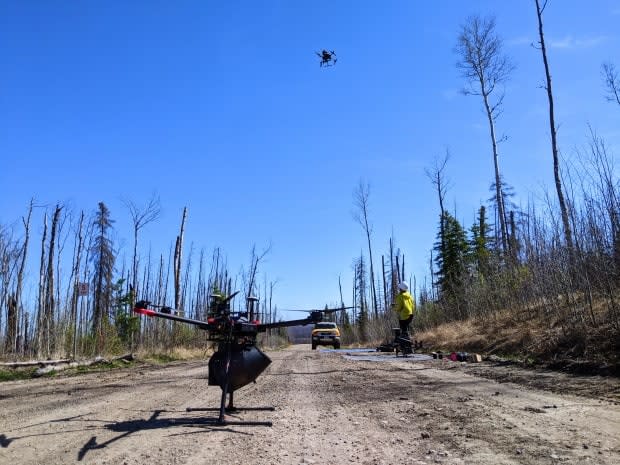This Ontario startup is testing drones for tree planting in Alberta

For the past two years, a number of burnt forest sites in northern Alberta — including Horse River, Fort McMurray and Wandering River — have been visited by a swarm of drones pelting the ground with seed pods roughly the size of a dime.
Carrying around 1,600 tree seed pods each, the drones shoot out five pods per second, covering the designated area in a matter of minutes. The location where the seed pods are targeted isn't random but rather mapped out by the drones using surveying software to detect areas to avoid, such as rivers, rocks, logs and piles of slash.
The drones belong to Flash Forest, an automated reforestation startup based out of Ontario, which is using its technology to replant forests lost to wildfires in Alberta.
The company, started in 2019, is working on its drone and seed pod technology after receiving $1.8 million in funding from Emissions Reduction Alberta (ERA) in 2021.
Cameron Jones, co-founder and chief operating officer for the company, said the biggest challenge it faces is developing seed pods durable enough to germinate.
The company has taken on the ambitious goal of planting four million trees for ERA by 2023.
"As soon as they're rained on, they actually swell up to about four times their size ... and then it's kind of wicking that seed and giving it moisture so it's got a little bit of a extra leg up," Jones told CBC's Edmonton AM.
The company's researchers are developing different varieties of seeds to see which pod recipe would work best. Jones said they have planted jack pine, white spruce and black spruce in Alberta, although they are heavily focused on creating recipes for white spruce seed pods.
He said he couldn't share photos of their seed pods because the company currently has two patents pending on the design.

The Special Report by the Intergovernmental Panel on Climate Change (IPCC), released in October 2018, suggested that an expansion of one billion hectares of forest worldwide would be vital in battling climate change.
The Canadian government made a commitment to plant two billion trees by 2030. In October, Natural Resources Canada awarded Flash Forest $1.33 million to continue its replanting efforts.
"Investing in this project allows Alberta to be a first adopter of this made-in-Canada solution to enable greater reforestation and remediation," Justin Riemer, CEO of ERA, wrote in an email.
Tree planting in Alberta
Alberta has an established tree-planting industry which has planted more than 100 million trees during this year's planting season and the same amount last year, according to Aspen Dudzic, director of communications for Alberta Forest Products Association.
But, Dudzic notes, the majority of tree planting is done in logging areas.
She said wildfire areas are often dangerous for tree planters due to the risk of trees breaking and falling.
"From a safety perspective we don't really have tree planters in those areas unless somebody has gone through and kind of cleared out all of the burnt material," she said.
Dudzic pointed out that generally Alberta trees are well adapted to wildfire and will regenerate quite successfully, but some species like white spruce may have difficulty regenerating.
Planting the seed of automation
Jones and his brother Bryce, who is co-founder and CEO of Flash Forest, witnessed a forest fire in their home city of Kelowna, B.C., in 2004.
The area has never been replanted, and brush grass has replaced trees, Jones said.
After seeing the loss of what was once an expansive forest, Bryce Jones looked into automated reforestation.
"He used to be a tree planter, and was always looking at ways ... we can kind of leverage tools for the environment," Cameron Jones said.
He said Flash Forest is focusing on "high severity burn" areas because he believes that's where it can make a big difference when it comes to climate change.
To help the company grow, Jones said it is focused on scaling up its pod-producing operation.
"By spring of 2023, we will be producing 210,000 pods a day and in about two to three years, we want to be producing about 1.5 million a day," he said.


